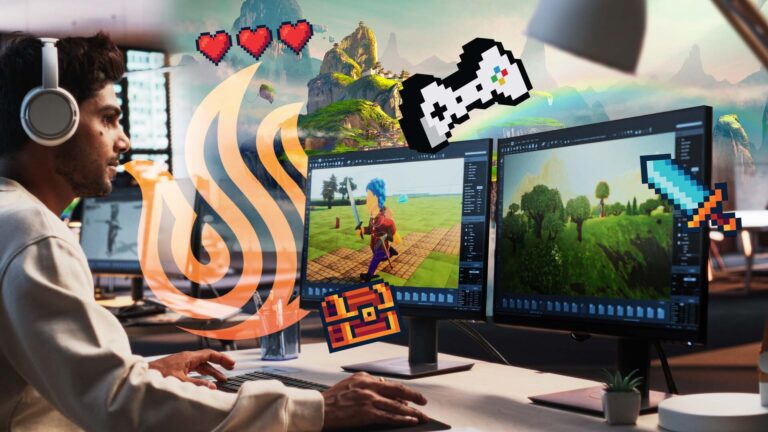The focus of modern video games is a shift from the initial days of Atari, massive arcade centers, and Nintendo’s household dominance. Although you could occasionally find vintage games that told a story, the emphasis was on fast-paced action and quick reflexes. While twitch-based games are still highly popular today, there are many titles that opt for a slower pace and aim to enthrall the player in a gripping narrative. The heightened emphasis on storytelling means that each game is filled with impactful words and clever scenarios created by passionate writing teams.
To include so many narrative elements, game companies are always looking for new game writers to fill their worlds with stories. If you love video games and literature, then becoming a game writer is an excellent career decision. A passion for both is an essential element to the profession. Plus, writing for video games is a whole lot of fun and immensely satisfying.
What Does a Game Writer Do?
Video game writers perform many roles throughout a career, and each of these roles involves creative writing. When you think about all the text and words found in modern video game titles, you get a vivid picture of how much work game writers are responsible for. Game writers create characters, scenarios, themes, dialog, and flavor text for every game they create.
How Do You Become a Game Writer?
The way to become a video game writer is to demonstrate your talent and get noticed by the world around you. If you are wondering how to obtain the skills necessary to reach the professional threshold, the most straightforward way is by attending a creative arts college. Formal education programs provide what you will need to know to land an entry-level position within the video game industry.
Game writing programs are successful because of the structured and curated nature of the curriculum. Each class builds upon the last to form a cohesive training regimen. The classes themselves are informed and taught by industry insiders, so you know the information is valid. Compared to the random online tutorials you may browse in your free time; a formal education is the real deal.
In addition to developing professional grade skills, your creative arts college will also help you get noticed in several ways. Not only can you network with industry professionals, but each class project can be used to build your artist portfolio. This one-two punch of education and exposure gives you the best chance of carving out a successful career as a video game writer.
How Do Game Writers Get Noticed?
There are three main ways that an aspiring game writer can get noticed and subsequently hired for major projects. Building a portfolio, establishing a network of contacts, and making your own assets will all contribute to your desirability in the eyes of potential employers. The more heads you can turn, the more opportunities will come knocking on your door.
Portfolio Website
Most jobs require you to create a resume or cover letter that explains why you are a good fit for the position. In the case of digital entertainment, artists create what is known as a portfolio. Portfolios are a collection of work that prove you are a talented artist. These collections of prior work can display both technical merit and your own personal style. A healthy combo of both makes your website more appealing.
In the digital age, artists keep all their best projects on a portfolio website. That way you can easily send the link to any potential employers or creative partners. As you can imagine, the presentation of your site is crucial. In the same way you would make sure the handwriting on your resume is clean, you must also polish your portfolio to the best of your ability. You will learn exactly how to set up your portfolio during your formal education program.
Networking
The reality of many jobs is that getting hired may be dependent on who you know within the industry. Video games are no exception, so having friends in the industry will serve you well. Each contact within digital entertainment is an opportunity to find out about new projects. A great deal of hiring managers look for leads from people who already work at their game studio. Having friends and allies who can put in a good word will significantly improve your career outlook.
It is wise to befriend as many of your classmates as possible. Even teachers can become valuable allies. Just be open to new contacts and relationships throughout your training to maximize the effectiveness of your network.
Credits in Digital Art
Even if your main goal is to write for games, this does not mean you should turn down other job opportunities within digital entertainment. Having your name in the credits of any completed project will greatly enhance your pedigree as an artist. You may not land your dream job on your first attempt, but the experience you gain will give you much more sway during your next job interview.
What are the Different Options in Game Writing?
Unless you are working in a small indie studio, you will collaborate with plenty of game writers to complete AAA game projects. Each game writer will specialize in one aspect of the game’ story. You may work on characters, dialogue, main story sequences, background lore/flavor text, or even create UI elements and menu screens.
Script Writing
While the script includes key lines of dialogue, the overarching narrative script details every action or event that takes place. How will personality be conveyed through animations? What crazy plot twist will happen next? As a script writer, you set the pace of the adventure by providing the template that everyone else follows.
Dialogue
Dialogue includes every spoken word uttered by the characters in a story. In the case of video games, the introduction of player choice and branching narrative paths opens the door to more iterations of dialogue. Not only will you craft believable lines that the characters would actually say, but you must also consider everything a player may attempt to do during key story encounters. If a gamer thinks of something new to try, there must be dialogue that acknowledges the user interaction.
Character Design
There aren’t many original story premises and concepts left in existence. Game writers in this role must create characters that the audience will relate to. To make relatable characters, you must provide your audience with endearing qualities, a unique personality, a goal to achieve, and some personal imperfections that add drama to the story. Without character development, the stars of a narrative feel hollow and meaningless.
Background Info and Flavor Text
Video games allow players to explore digital worlds at their own pace. If a player finds this enjoyable, they will want to learn as much about the fictional world as possible. To enhance the believability and immersion in digital entertainment, background information must be provided to the player. Much like dialogue writing, the approach to this aspect of writing changes when you are making an interactive product.
Items such as collectable books, notes, and audio logs are another way to add extra content to the narrative. Then, there is the more traditional flavor text. When playing a video game, each item, enemy, and element of the game world must have a clear description. Flavor text provides the details players need to interact with each part of the game world.
User Interface and Menus
Although menus may not be the most exciting aspect of games, the feedback, and data they provide to the player is irreplicable. Game writers are tasked with drafting clear instructions that everyone can understand. Menu and UI text is informative by nature, so each instruction or piece of information must be conveyed in a clear manner. Menu writers work closely with visual artists to ensure the final UI is simple and readable even during frantic action scenes.
Want To Learn More?
Did learning about writing for video games interest you? Today, the creative and financial success of major game releases increasingly depend on the strength of the game’s world, characters, and story. University of Silicon Valley’s new—one of only a few such programs—B. A. in Game Design with a Game Writing Focus was developed to empower and support aspiring writers and narrative designers who want to be a part of this bold new storytelling frontier.
University of Silicon Valley is uniquely poised to offer a meaningful and valuable education for 21st century students. We believe in an education that directly correlates with the work you’ll be doing after you graduate. Interested in learning more? Contact Us today.


